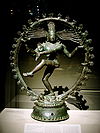Shiva Tandava Stotra
Shiva Tandava Stotram (शिवताण्डवस्तोत्रम्) is a stotra, hymn of praise in the Hindu tradition that describes Shiva's power and beauty. It was sung by the son of Rishi Vishrawas (aka Vishrava), Ravana. Both the ninth and tenth quatrains of this hymn conclude with lists of Shiva's epithets as destroyer, even the destroyer of death itself. Alliteration and onomatopoeia create roiling waves of resounding beauty in this example of Hindu devotional poetry.
In the final quatrain of the poem, after tiring of rampaging across the Earth, Ravana asks, "When will I be happy?" Because of the intensity of his prayers and ascetic meditation, of which this hymn was an example, Ravana received from Shiva the boon of indestructibility by all powers on heaven and earth.
Ravana
It is said that when he was tired of rampaging across the earth, Ravana returned to Lord Shiva to request moksha, release from the bondage of endless rebirth. Shiva replied that he had granted Ravana the boon of indestructibility[citation needed], and that Ravana must instead seek moksha from Lord Vishnu(According to srimadbhagavatam chanto4 chapter6 verses 43 to 50 it is clear that shiva is ordaining jivas to spiritual world and heavens etc. So shiva can give liberation to any one. But ravana was jaya who is guarding the entrance of lord vishnu's residence and cursed by four sons of brahma and his destiny lies in the hands of lord vishnu). In this version of Ravana's story, his battle with Rama can be interpreted as a pretext to attain death, and through death, liberation. Ravana's poignant cry in the final quatrain of poetry — "When will I be happy?" is echoed by modern man in his quest for earthly fulfillment and ultimate liberation from its bondage.
A compelling and complex personality, Ravana is for many Hindus a legendary hero, a scholar of immense intelligence and the devoted husband of one of traditional five perfect women, Mandodari.Ravana married Maya's daughter, Mandodari, who was a very beautiful & righteous wife. He had a son by her, named Meghanaada (which means the 'sound of the clouds' or the 'sound of thunder'). Meghanaada defeated Indra, the king of gods, and earned the title of 'Indrajit'. Ravana's great-grandfather was Brahma (God of Ultimate Knowledge). He had advanced knowledge of mathematics, science and Ayurveda.
He was obsessed with his powers and was egoistic, and to display and prove his powers he was about to move Mount Kailash (the abode of Shiva who was his ancestor god). He managed to lift the mountain but Shiva immediately placed it back just by pressing his toe crushing Ravana's fingers in the process. That is when Ravana sings "Tandav Stotra" and he was spared and blessed with chandrahas (moon sword by Lord Shiva) considered one of the most powerful weapons in Hindu Mythology.
Poetic characteristics
The stotra is in the Panchachaamara chhanda (16 syllables per line of the quatrain, with laghu and guru characters alternating).
Internal links
Shiv Tandav Stotra at Wikisource (English)


